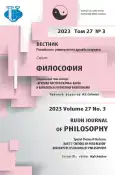Deweyan Critique of Fundamentalism
- Authors: Lemanto E.1
-
Affiliations:
- RUDN University
- Issue: Vol 27, No 3 (2023): KANT’S “CRITIQUE OF PURE REASON” AND WAYS OF ITS READING BY PHILOSOPHERS
- Pages: 809-817
- Section: PERSON AND SOCIETY
- URL: https://journal-vniispk.ru/2313-2302/article/view/325252
- DOI: https://doi.org/10.22363/2313-2302-2023-27-3-809-817
- EDN: https://elibrary.ru/IWZLEG
- ID: 325252
Cite item
Full Text
Abstract
Religious fundamentalism continues to be an enormous concern in the aftermath of the 9/11 tragedy since the atrocity involved numerous extremist groups, including religious fundamentalist ones. This horrible tragedy has brought in all citizens of the globe mindful of the existential threat of these organizations. Their existence sparks an immense discourse in various fields, including in the academic field that centres around the query of ‘what drives them to act mercilessly and inhumanely.’ Aside from political matters, their extremism is shaped by their method of approach to the doctrines or dogmas, teachings, ideologies, and religious traditions of faith they espouse. The methodology used by fundamentalists in approaching their religious texts and traditions is one of the major issues confronting religious fundamentalism. That methodology refers to the authoritative method, which entails two notable inquiries. Why do fundamentalists consider their religious doctrines or dogmas to be infallible or unquestionable? Why do they presume that all other knowledge and values are subordinate to their religious texts? This philosophical analysis seeks to investigate and evaluate the flaws of the authoritative method within fundamentalism by contrasting it with the Deweyan experimental or scientific method and bridging the two methods with the ‘reflective method’ the author postulates.
About the authors
Eduardus Lemanto
RUDN University
Author for correspondence.
Email: lemanto@yahoo.com
PhD Student, Department of Social Philosophy 6 Miklukho-Maklaya St., Moscow, 117198, Russian Federation
References
- Lemanto E. Fundamentalism: a Religious Cognitive Bias? A Philosophical Discourse of Religious Fundamentalism. RUDN Journal of Philosophy. 2023;27(1):163-174. https://doi.org/10.22363/2313-2302-2023-27-1-163-174
- Wood RW, Hill PC, Williamson WP. The Psychology of Religious Fundamentalism. New York, London: The Guilford Press; 2005.
- Wittgenstein L. Lectures & Conversation: on Aesthetics, Psychology and Religious Belief. Barret C, editor. Berkeley and Los Angeles: University of California Press; 1967.
- Kierkegaard S. Concluding Unscientific Postscript to the Philosophical Crumbs. Hannay A, editor and transl. Cambridge: Cambridge University Press; 2009.
- Arnswald U, editor. In Search of Meaning: Ludwig Wittgenstein on Ethics, Mysticism and Religion. Karlsruhe: Universitätsverlag Karlsruhe; 2009.
- James W. The Varieties of Religious Experience: A Study in Human Nature. London and New York: Routledge; 2002.
- Hickman LA. Pragmatism as Post-Postmodernism: Lessons from John Dewey. New York: Fordham University Press; 2007.
- Dewey J. A Common Faith. USA: Yale University Press; 1934.
- Dewey J. Experience and Nature. London: George Allen & Unwin, LTD; 1929.
- Rahman F. Revival and Reform in Islam: A Study of Islamic Fundamentalism. Oxford: Oneworld Publication; 2000.
- Dewey J. The Influence of Darwin on Philosophy. New York: Henry Holt and Company; 1910.
- Madan TN. Religious Pluralism: Perspectives from Gandhi and Indian Islam. India International Centre Quarterly. 2014;41(1):153-63. Available from: http://www.jstor.org/stable/44733580 (accessed: 02.02.2023).
- Fesmire S. John Dewey and Moral Imagination. Bloomington & Indianapolis: Indiana University Press; 2003.
- Stuckrad Kv. The Scientification of Religion: An Historical Study of Discursive Change, 1800-2000. Boston/Berlin: Walter de Gruyter Inc.; 2014.
Supplementary files









